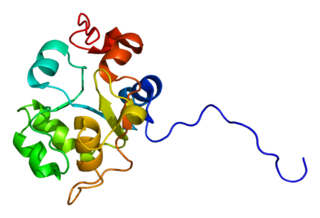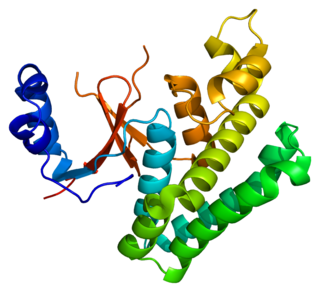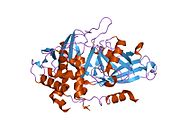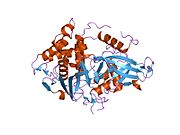
Deubiquitinating enzymes (DUBs), also known as deubiquitinating peptidases, deubiquitinating isopeptidases, deubiquitinases, ubiquitin proteases, ubiquitin hydrolases, ubiquitin isopeptidases, are a large group of proteases that cleave ubiquitin from proteins. Ubiquitin is attached to proteins in order to regulate the degradation of proteins via the proteasome and lysosome; coordinate the cellular localisation of proteins; activate and inactivate proteins; and modulate protein-protein interactions. DUBs can reverse these effects by cleaving the peptide or isopeptide bond between ubiquitin and its substrate protein. In humans there are nearly 100 DUB genes, which can be classified into two main classes: cysteine proteases and metalloproteases. The cysteine proteases comprise ubiquitin-specific proteases (USPs), ubiquitin C-terminal hydrolases (UCHs), Machado-Josephin domain proteases (MJDs) and ovarian tumour proteases (OTU). The metalloprotease group contains only the Jab1/Mov34/Mpr1 Pad1 N-terminal+ (MPN+) (JAMM) domain proteases.

Ubiquitin specific peptidase 5 is an enzyme that in humans is encoded by the USP5 gene.

Ubiquitin carboxyl-terminal hydrolase 8 is an enzyme that in humans is encoded by the USP8 gene.

Ubiquitin carboxyl-terminal hydrolase 6 (USB6), also termed TRE17 and Tre-2, is a deubiquitinating enzyme that in humans is encoded by the hominid USP6 gene located at band 13.2 on the short arm of chromosome 17. Deubiquitinating enzymes (DUBs) are enzymes that act within cells to remove ubiquitins from various functionally important proteins. Ubiquitin enzymes add ubiquitin to these proteins and thereby regulate their cellular location, alter their activity, and/or promote their degradation. By deubiquitinating these proteins, DUBs counter the effects of the ubiquinating enzymes and contribute to regulating the actions of the targeted proteins. In normal adult tissues, USP6 is highly expressed in testicle tissue, modestly expressed in ovarian tissue, and absent or minimally expressed in other tissues. It is also highly expressed in fetal brain tissue. The specific functions of USP6 are poorly defined primarily because its presence is restricted to primates: there are no available animal models to determine the effects of its deletion, although some studies suggest that UPSP6 contributes to normal brain development. In all events, USP6 has gained wide interest because of its abnormally increased expression by the neoplastic cells in various tumors derived from mesenchymal tissue.

Ubiquitin carboxyl-terminal hydrolase isozyme L5 is an enzyme that in humans is encoded by the UCHL5 gene.

Ubiquitin carboxyl-terminal hydrolase 16 is an enzyme that in humans is encoded by the USP16 gene.

Ubiquitin specific protease 4 (USP4) is an enzyme that cleaves ubiquitin from a number of protein substrates. Prior to the standardization of nomenclature USP4 was known as UNP, and was one of the first deubiquitinating enzymes to be identified in mammals. In the mouse and human the USP4 protein is encoded by a gene containing 22 exons.

Ubiquitin specific peptidase 18 (USP18), also known as UBP43, is a type I interferon receptor repressor and an isopeptidase. In humans, it is encoded by the USP18 gene. USP18 is induced by the immune response to type I and III interferons, and serves as a negative regulator of type I interferon, but not type III interferon. Loss of USP18 results in increased responsiveness to type I interferons and life-threatening autoinflammatory disease in humans due to the negative regulatory function of USP18 in interferon signal transduction. Independent of this activity, USP18 is also a member of the deubiquitinating protease family of enzymes. It is known to remove ISG15 conjugates from a broad range of protein substrates, a process known as deISGylation.

Ubiquitin thioesterase OTUB1 also known as otubain-1 is an enzyme that in humans is encoded by the OTUB1 gene. Alternative splicing results in multiple transcript variants.

Ubiquitin-specific protease 36 is an enzyme that in humans is encoded by the USP36 gene.

Ubiquitin carboxyl-terminal hydrolase 1 is an enzyme that in humans is encoded by the USP1 gene.

Ubiquitin carboxyl-terminal hydrolase 15 is an enzyme that in humans is encoded by the USP15 gene.

Ubiquitin carboxyl-terminal hydrolase 33 is an enzyme that in humans is encoded by the USP33 gene.

Ubiquitin carboxyl-terminal hydrolase 48 is an enzyme that in humans is encoded by the USP48 gene.

Ubiquitin carboxyl-terminal hydrolase 13 is an enzyme that in humans is encoded by the USP13 gene.

Ubiquitin-specific protease 14 is an enzyme that in humans is encoded by the USP14 gene.

Ubiquitin carboxyl-terminal hydrolase 20 is an enzyme that in humans is encoded by the USP20 gene.

Sentrin-specific protease 8 is an enzyme that in humans is encoded by the SENP8 gene.

Ubiquitin carboxyl-terminal hydrolase 40 is an enzyme that in humans is encoded by the USP40 gene.

Ubiquitin thioesterase OTUB2 is an enzyme that in humans is encoded by the OTUB2 gene.
























